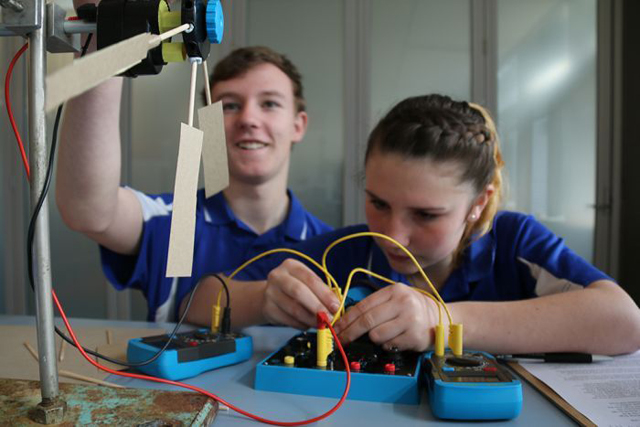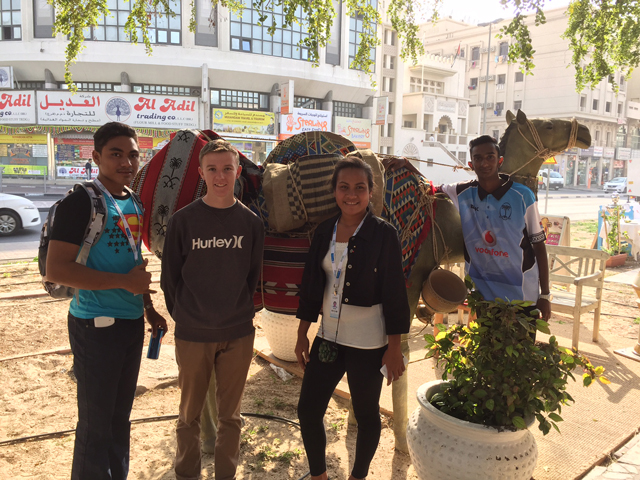This southern Tasmanian school has long had a dream to be a beacon for a better world. Now it’s getting reward for its effort.

Toby Thorpe and Zephryn Fox at work on a renewable energy project. PHOTO ABC
For years, Huonville High under its former principal, Alison Grant, sought to become a beacon for learning about the environment, the climate and our carbon footprint.
I first became aware of that dream in May 2009, when teacher David Brown invited me to talk to his students about man-made climate change and its implications for their school and community.
Last winter I had the chance to see how things had developed at an “energy futures think tank” organised by environmental educator Nel Smit and led by Huonville High students Toby Thorpe and Zephryn Fox, at the Education Department’s Sustainability Learning Centre at Mt Nelson. A discussion led by expert outsiders ranged across solar energy, batteries and electric cars, inventing things, biofuels, energy auditing and the energy-efficient home.
Of my many encounters with students over the years, this one ranked as one of the best, because the students themselves were driving it. My take-home message was that anything seems possible when young people are given the chance to take a leading role.
Changing the direction of society takes time, work and resources. Huonville High put in the hard yards over many years, but at the time of that seminar it still lacked the resources needed to really make its community sit up and take notice.
But this month, when schools are supposed to be in summer hibernation, Huonville hit the jackpot.

Toby Thorpe with other Oceania candidates for the Zayed prize, in Abu Dhabi. PHOTO Geoff Williamson
In Abu Dhabi, on behalf of his school, Toby was presented with the Oceania award for the Zayed Future Energy Prize for Global High Schools by the city’s Crown Prince, Sheik Mohammed bin Zayed. There were four other winners, schools in Ireland, Bolivia, Kenya and Bali.
The annual Zayed prize, celebrating innovation, vision and leadership in renewable energy and sustainability, pays tribute to the former president of the United Arab Emirates, Sheikh Zayed bin Sultan al Nahyan, who championed environmental stewardship.
The prize provides Huonville High with $US100,000, or a little over $130,000 Australian. That level of funding for sustainability studies is rare or unprecedented in Australia for a single public school, opening up prospects that the school could previously only dream about.
The school’s solar array produces 2.5 per cent of its energy needs; Zayed funding will raise that to 60 per cent. A disused campus building will be made into a “Zayed Energy Hub” showcasing solar PV, battery storage, insulation, low-carbon lighting and heating and smart energy management.
The prize complements the school’s existing effort in science, technology, engineering and mathematics, as a pilot school for EnergyWise, a TasNetworks-Greening Australia program producing resources and curriculum materials, which gets under way this year.
Besides transforming the school, says Toby Thorpe, the prize offers opportunities for students and the broader community to learn about renewable energy. His new principal, Geoff Williamson, sees his school contributing to “a global blueprint” for schools offering renewable energy studies.
These are worthy and eminently achievable aims. Huonville is in a growing cohort of schools, households and communities who see the future value of distributed renewable energy. A total of 27.4 million solar panels now grace Australian roofs, more than one for every single citizen.
But cutting back our uncontrolled carbon emissions demands a whole-of-society, whole-of-economy response that this country has barely begun to address. Compared to that, one grant of $130,000 to one school in the Huon Valley is chickenfeed.
Energy minister Matthew Groom congratulated the school, but he, his government and their federal counterparts should be considering the level of resources required to make a difference community-wide, and come up with something more than our present, pathetically inadequate climate response.
Every journey starts with a step. I’m glad the minister was pleased at this step because it suggests he sees value in what the school is doing, and gives a glimmer of hope that he will come to see why this kind of effort is needed on a much larger scale.
The Zayed prize will enable Huonville High to show its community how good energy management can work for everyone. If a smidgin of that awareness could filter through to people with influence in the wider world we might start to get somewhere.
